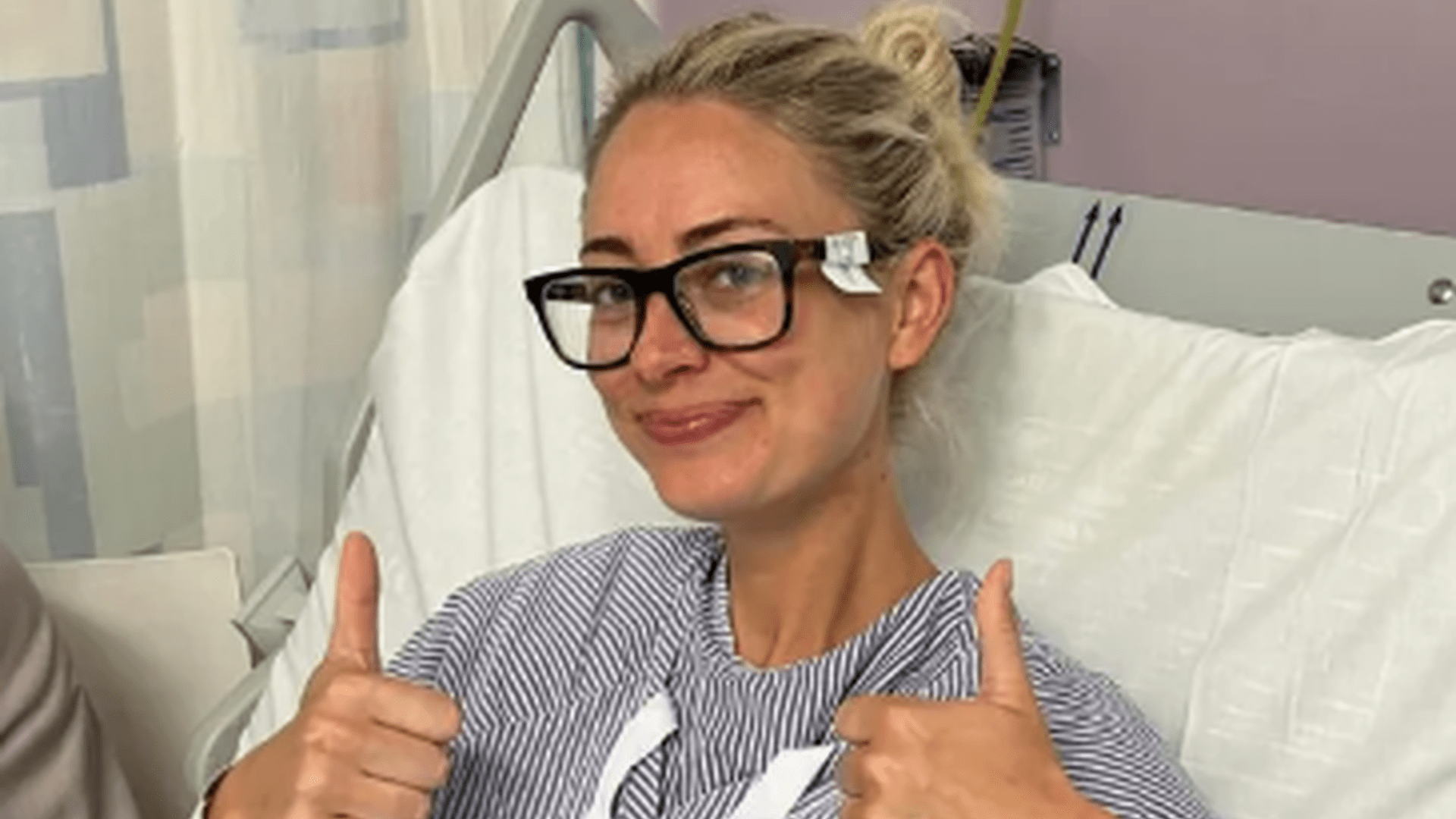A YOUNG woman says doctors initially dismissed her “funny episodes” as panic attacks – but her mum recognised them as a sign of something more.
Jessie-Mae Lambert, 27, visited her GP after experiencing strange sensations and visual disturbances, which her doctor attributed to anxiety.
7

7

7
It was only after her mum recognised the “episodes” as seizures and insisted she be referred to the hospital – that a Grade 2 astrocytoma brain tumour was discovered.
She then underwent a six-hour operation at Nottingham’s Queen’s Medical Centre to take away as much of the tumour as possible.
But because the tumour – which measures 4cm by 3cm – sits on top of arteries only 40 per cent of it could be removed.
The marketing manager has since undergone six weeks of daily radiotherapy sessions and will spend the rest of her life being regularly monitored.
Jessie, from Nottingham, is now urging anyone with health concerns to trust their bodies, seek a second opinion, and push for appointments.
She said: “It was in October last year that I started having ‘episodes’ where I just felt a bit out of it, but the doctor said they were panic attacks and prescribed anxiety medication.
“It was only when it happened in front of my mum that she realised it was a seizure and she took me back to the GP.
“Unbelievably, he said that I needed to make up my mind whether they were panic attacks or seizures – even though I’d only ever described the symptoms to him.
“I was eventually referred to the hospital and told I needed an MRI and an EEG scan.
“I was put on a waiting list and getting more and more concerned.
“I was ringing every day to try and get a cancellation and I was on first name terms with all the staff.
“But in April I got a last-minute appointment, and the MRI revealed the tumour.
“My oncologist showed me the scan and I can’t express the sensation – just total panic descended all over my body.
“It was horrific looking at my mum and seeing her distraught too, but I’ve had to learn that not everyone can be lucky.”
Around one in three brain tumours diagnosed in the UK are astrocytomas.
Being Grade 2, this meant Jessie’s was slow growing and diffuse, meaning it can be difficult to remove.
Specialists agreed to remove some of the brain tumour but warned her that the surgery was not without risks.
Jessie, who works for Alphageek Digital, in Derby, was told she could have a stroke on the operating table and wake up unable to walk or talk.
I’ve been contacted by so many girls, who all feel as if they are fighting to be taken seriously
Jessie-Mae Lambert
Although the surgery was successful, and Jessie was allowed to go home the next day, she was later readmitted with an infection and spent a week on intravenous antibiotics.
She added: “Just before the operation I wasn’t as scared as you might expect, I was actually just relieved to finally be going to theatre – it had been such a struggle to get diagnosed.
“When I woke up, I asked if I could still walk, and I was so relieved to still be able to wiggle my toes and to be able to talk.
“But because so much of the tumour was left behind, I then had to undergo six weeks of radiotherapy in Nottingham City Hospital.
“It took an hour to get there every day, and I wasn’t allowed to drive.
“My mum has been more than amazing and some of my friends even took time off work to take me.
“The radiotherapy wasn’t a nice experience and it has led to a return of epilepsy, which I had been warned might happen, but it was important to try and get rid of some of the grade three cells that showed up on the scan.”

7
HELPING HAND
Jessie has documented every step of her treatment on TikTok to raise awareness of the symptoms and provide support for others going through similar experiences.
She has been talking to six young women who contacted her after experiencing seizures or receiving similar diagnoses.
“I’ve been contacted by so many girls, who all feel as if they are fighting to be taken seriously,” Jessie added.
“They all feel like no one listens – which is how I felt too.
“This is why I am telling my story publicly. Because people need to be annoying, ring their doctors every day, nag for an appointment.
“You have to trust your body and push and push. Never take no for an answer.
“In a way I am lucky because my tumour was pressing on something that caused the epilepsy, but it could have been much worse in years to come.”
Now Jessie has finished her radiotherapy treatment she is hoping to return to work one day a week and is also planning a trip to Italy to cheer on a marathon runner competing in her name.
MARATHON RUNNER
Phoebe Collier, from Derby, learned about Jessie’s situation through a mutual friend and has raised £1,300 for Brain Tumour Research by completing three marathons in three countries over six week
She has so far completed the challenge in Portugal and The Netherlands and will soon take on a marathon in Italy, where she will be cheered on by Jessie.
Jessie said: “I can’t wait to go and cheer her on and to return to work.
“My bosses at Alphageek could not have been more supportive and have really treated me as part of their family. I couldn’t thank them more, they have just been gorgeous.
“My oncologist looked like he was going to have a heart attack when I said I was going back to work, but I miss it and I just want to return to some normality.”
Jessie knows that she cannot be completely cured and that she will spend the rest of her life being monitored.
For now, Jessie will need a scan every three months to monitor whether the tumour has developed or grown.
She added: “It’s very scary to think that I will spend the rest of my life waiting for good or bad news.
“But I don’t want it to beat me. I’ve absolutely bossed brain surgery, the infection and radiotherapy – I am determined to just keep on fighting.”
To make a donation visit: Fundraiser by Phoebe Collier : Running for Jessie: supporting Brain Tumour Research
Symptoms of a benign brain tumour
A benign brain tumour is a mass of cells that grows relatively slowly in the brain.
Benign means it in not cancerous.
Non-cancerous brain tumours tend to stay in one place and do not spread.
Some slow-growing tumours may not cause any symptoms at first.
When symptoms occur, it’s because the tumour is putting pressure on the brain and preventing a specific area of the brain from working properly.
As the tumour grows and increases pressure in the skull, you might experience:
- New, persistent headaches that are sometimes worse in the morning or when bending over or coughing
- Feeling sick all the time
- Drowsiness
- Vision problems, such as blurred or double vision, loss of part of your visual field and temporary vision loss
- Epileptic seizures that may affect the whole body, or you may just have a twitch in one area
See a GP if you develop any of these symptoms.
They’ll examine you and ask about your symptoms.
If they suspect you may have a tumour or are not sure what’s causing your symptoms, they may refer you to a brain and nerve specialist for further investigation.
Source: NHS

7

7

7




